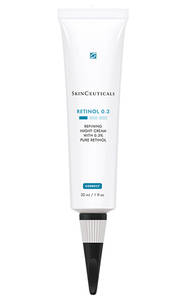Retinol and retinoids have recognised as the gold standard in anti-ageing - shown to be effective for the way they increase cell turnover in the skin and improve skin tone and texture. But how do retinoids and retinol differ and which one is right for you?.
Retinol and retinoids are both derivatives of vitamin A – the clinically proven star ingredient revered for the way it accelerate cellular turnover and tackles ageing signs, acne and discolouration.
Retinoid is a term used to describe any product that derives from vitamin A, while retinol is one, of many, types of retinoid. Other types of retinoid are retinoic acid or retinol palmitate so if you see these labelled on an ingredients label, they all work towards the same goal: brighter, smoother skin.
Retinoids is a term to describe all Vitamin A derivatives. Retinol is available as an over the counter preparation and retinoids are prescription items only.
Where can you get retinol and retinoids?
Retinol is available to buy over the counter and is now commonplace in most results-driven skincare ranges, used at a lower concentration in serums, treatments and moisturisers alongside other ingredients. Prescription retinoids, however, contain a significantly higher concentration of vitamin A and are more potent. As such, they should be prescribed by a dermatologist or doctor.
Can you use retinoid and retinol together?
As prescription-strength retinoids are already very high strength, there would be no need to mix them with retinol. This would also cause the skin to become very irritated and damage your skin’s protective natural barrier.
Which shows faster results on the skin?
Retinoids show results quicker than retinol due to their stronger potency. Retinol works in a more gradual way, so it usually takes slightly longer to see the effects. Both, however, benefit the skin in the same way.
Prescription retinoids have a much higher concentration of the active ingredient and are also readily available for the skin to use. Retinoids on the other hand are in a stable form, but pro-retinol, such as retinyl palmitate, retinyl acetate, retinaldehyde, propionic acid or retinyl linoleate need a few steps to be converted by the body to the active retinoids acid. Therefore it tends to be of lower concentration and take longer to work.
Who are these ingredients suitable for?
Retinoids can be used to treat, melasma, acne, rosacea, hyperpigmentation, and solar lentigines. From a cosmetic perspective fine lines, sun damage and skin radiance can be addressed. The key is to be patient, the damage did not happen overnight, so it will take time to repair. It’s also important to note that they are not suitable in pregnancy. If you have a sensitive skin or a damaged skin barrier, it’s best to address this first before introducing these ingredients.
Then as you introduce the ingredients- You might want to start with a retinol as part of your night-time routine unless you have a very specific medical concern that requires a prescription retinoid, If you have acne then a prescription grade treatment is going to be more effective.
It’s advisable to start with a low potency retinol so that your skin can become tolerant to it.
Skinceuticals 0.3% is good for first-time users as it is formulated to minimise irritation with a steady even release of retinol. Apply it in the evening, starting once or twice a week and increasing your frequency to every other night as your skin becomes more tolerant. You can use over and or under a non active moisturiser to buffer the delivery of the active ingredient .
Use a good broad spectrum SPF daily and reapply regularly. Avoid direct sunlight exposure.
Shop now:
https://www.nualawoulfe.ie/products/skinceuticals-retinol-0-3-30ml
SkinCeuticals 50 Plus Skin Care Bundle - 20% Off Limited Offer . Retinol, CE Ferulic antioxidant and SPF 50 .
https://www.nualawoulfe.ie/products/skinceuticals-50s-skin-care-bundle-20-off-limited-offer





















































